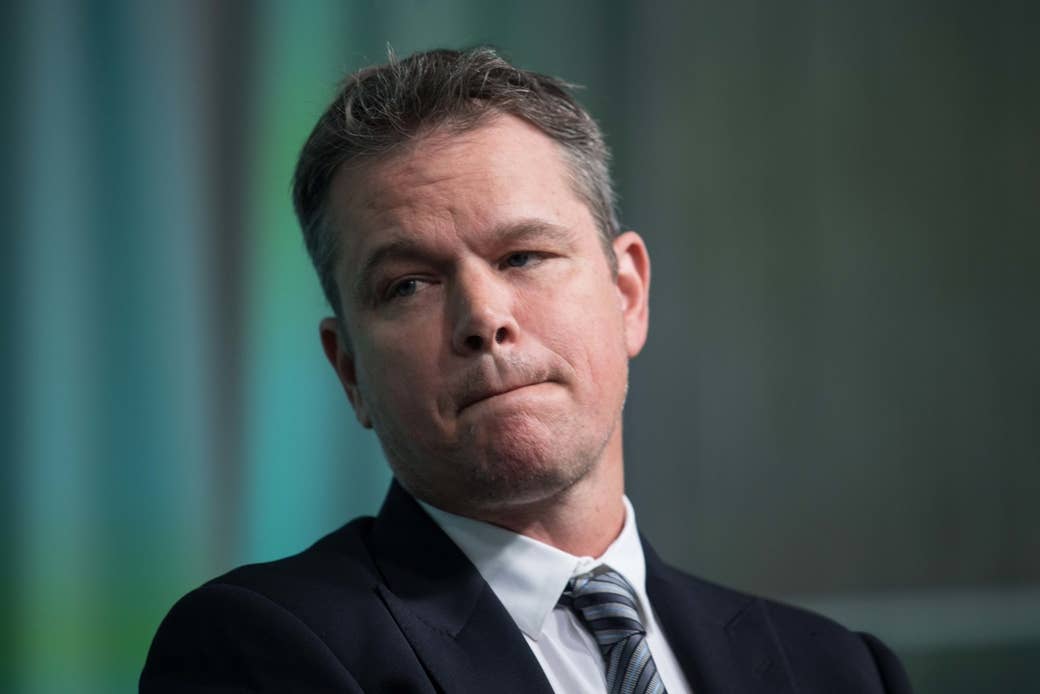
Matt Damon is a Hollywood A-lister who presents himself as just a regular guy. He’s the star of the Jason Bourne action series, various high-budget thrillers, and a surprising number of films where he must be rescued from space. He regularly appears in Oscar season prestige movies directed by male directors that sound good on paper but fade by January.
He is charming but never interesting. It takes directors like the Coen brothers or Steven Soderbergh to make his presence memorable. His notable qualities include being best friends with fellow A-list actor Ben Affleck, having blonde hair and a toothy smile, “being from Boston,” and using his capital and genuine smarts to give interviews in which he will discuss politics if given the opportunity.
Damon cares. He likes public school teachers. He’s the founder of Water.org, an organization that advocates for clean drinking water in developing countries. His sonorous voice can be found narrating documentaries that detail such things as the 2008 financial crisis and our faulty educational system. He’s the platonic ideal of a Hollywood liberal.
Yet in 2017, Damon’s careful public image is showing signs of wear. It may be a case of a man who became a movie star in the last century adjusting badly to a world where the internet’s real-time reaction machine can expose someone’s intellectual failings and emptiness with one viral video. Hollywood has an outsize influence on the things that we talk about — if it weren’t for Hollywood, our current president would not be in office.
Stars like Damon embody the default liberalism of Hollywood: prominent names with money who give to the right charities and who make brave speeches denouncing the state of political discourse today. But this form of liberalism is growing rapidly outdated as Hollywood’s complicity around issues of sexual harassment and assault become clear. In interviews, Damon makes a point to espouse “good politics,” but his consistent patterns of gaffes and his films (notably lacking in female directors) reflect an incuriosity and indifference to the voices of consistently marginalized Hollywood members (women — especially women of color, LGBT actors, and sexual assault victims) who now have the power to speak up and to tell him he’s wrong through public platforms.
As he embarks on a press tour for this month’s Suburbicon, which flopped this weekend, and December’s Downsizing, he may finally be forced to grapple with the ways in which his politics seem incomplete.
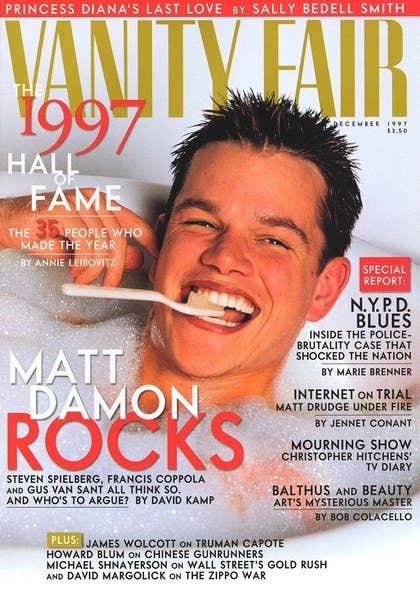
Here is 27-year-old Damon on the cover of Vanity Fair’s December issue in 1997. He is right on the verge of the A-list. He is Private Ryan in Steven Spielberg’s next movie; he is starring in a Francis Ford Coppola adaptation of a John Grisham book; and Good Will Hunting, a small independent movie that he wrote and starred in, is about to be released and will figure heavily into next year’s Oscar race. He is going places, and Vanity Fair wants in on the action, introducing us to Damon as a regular guy.
He’s described as a “nice knucklehead,” in “clothes that still look mother-bought,” and he is mostly talking about the roles he lost to Chris O’Donnell in Scent of a Woman and Batman and Robin. His mom thinks acting will screw him up. He really wants a career like Ed Harris. He is really obsessed with Chris O’Donnell (which just plays cruel 20 years down the line, when Damon is on the A-list and O’Donnell stars in NCIS: Los Angeles). He can’t get over O’Donnell’s earnings ($10 million), and he says that if he made that much money, he would not be shilling his movies. “Shit, man, give me five million bucks once,” Damon said, “that’s $500,000 a year for the rest of your life if you invest it.”
That next month, Good Will Hunting, released by Miramax, the New York “indie” studio bought by Disney and notable for its ability to run elaborate Oscar campaigns — and the larger-than-life reputation of its main mogul, Harvey Weinstein — played in theaters, pulling in a modest $3 million in its first month of limited release that December.
In 2017, Damon’s careful public image is showing signs of wear.
It was a steady, word-of-mouth hit that made the careers of Damon and Affleck. It did well at the 1997 Oscars: Robin Williams won for Best Supporting Actor, and Damon and Affleck won for Best Original Screenplay. But Good Will Hunting wasn’t just a good movie — it left a mark, eventually responsible for a lot of now-familiar pop culture tropes: the Boston movie featuring “honorable” working-class white folks committing crimes or being really sad, the touting of Howard Zinn’s A People’s History of the United States as the go-to talisman for vaguely leftist politics (in 2000, Damon, Affleck, and Zinn made an appearance at a living-wage rally for Harvard employees), and the unstoppable influence of “Matt and Ben,” a modern-day power couple with an unimpeachable best-buds-since-childhood friendship.
The two friends fell into neat slots, smart and pretty, especially if you conflated them with their Good Will Hunting characters. Out of the two, Damon was the smart one. The son of a college professor, he was a Harvard dropout who first thought of Will Hunting in a class and was so dedicated to the craft of acting that he lost 60 pounds to play a soldier in a middling Meg Ryan film; and since those early years Damon has managed to corral that good favor into innocuous press coverage.
According to Damon — and profiles of Damon over the years essentially corroborate this — he is boring. He’s pulled off, multiple times, being on the cover of a magazine and having the subject be anything but Matt Damon: a snarky 2007 GQ feature with some casual anti-gay language tells readers “the most interesting thing [Damon] did in Madrid was take a long, loud piss”; a 2009 Esquire profile on a trip to India works as an ad for his charity Water.org; a trip to the zoo with his dad for a 2012 GQ profile gets at some of Damon’s politics and feistiness; and a 2013 Esquire profile goes out of its way to convince us that Damon’s just a regular guy, drinking beer in a remote German village.
But even as he played benign in the press, he always had a tendency toward political outspokenness, especially during the Bush years, and, notably, in a world where it wouldn’t have turned into 24-hour news and scandal. He argued on a 2007 episode of Hardball that if we all decide to go to war, then we need to share that burden, and he suggested that if George W. Bush’s twin daughters were of age (they were), they should enlist. Michael Moore told him that he should run for president. He criticized Barack Obama for a variety of failures, from with squandering his mandate to execute change (with a Democratic House and a Democratic-leaning Senate), to Obama’s policy on drone strikes, and his failure to reform Wall Street.
Such outspokenness aligned him with a gauntlet of Hollywood liberal statesmen including George Clooney, Martin Sheen, and Alec Baldwin. His positions were largely innocuous to most liberals, galling enough to grate conservatives and in short, cast him in a warm spotlight, where he could be the good guy, Josiah Bartlett in The West Wing, so to speak. See this 2011 video where he defends teacher tenure (with his mother by his side), calling education policy “intrinsically paternalistic,” and in another video from that same rally he advocates for higher taxes saying “it’s criminal that so little is asked of the wealthy. I don’t mind paying more.” Though Damon has proven to be politically outspoken in some ways, they contrast sharply with his repeated blind spots — which in the past two years have been made public in embarrassing fashion. (Is it obvious that Damon has no social media presence? It will be.)
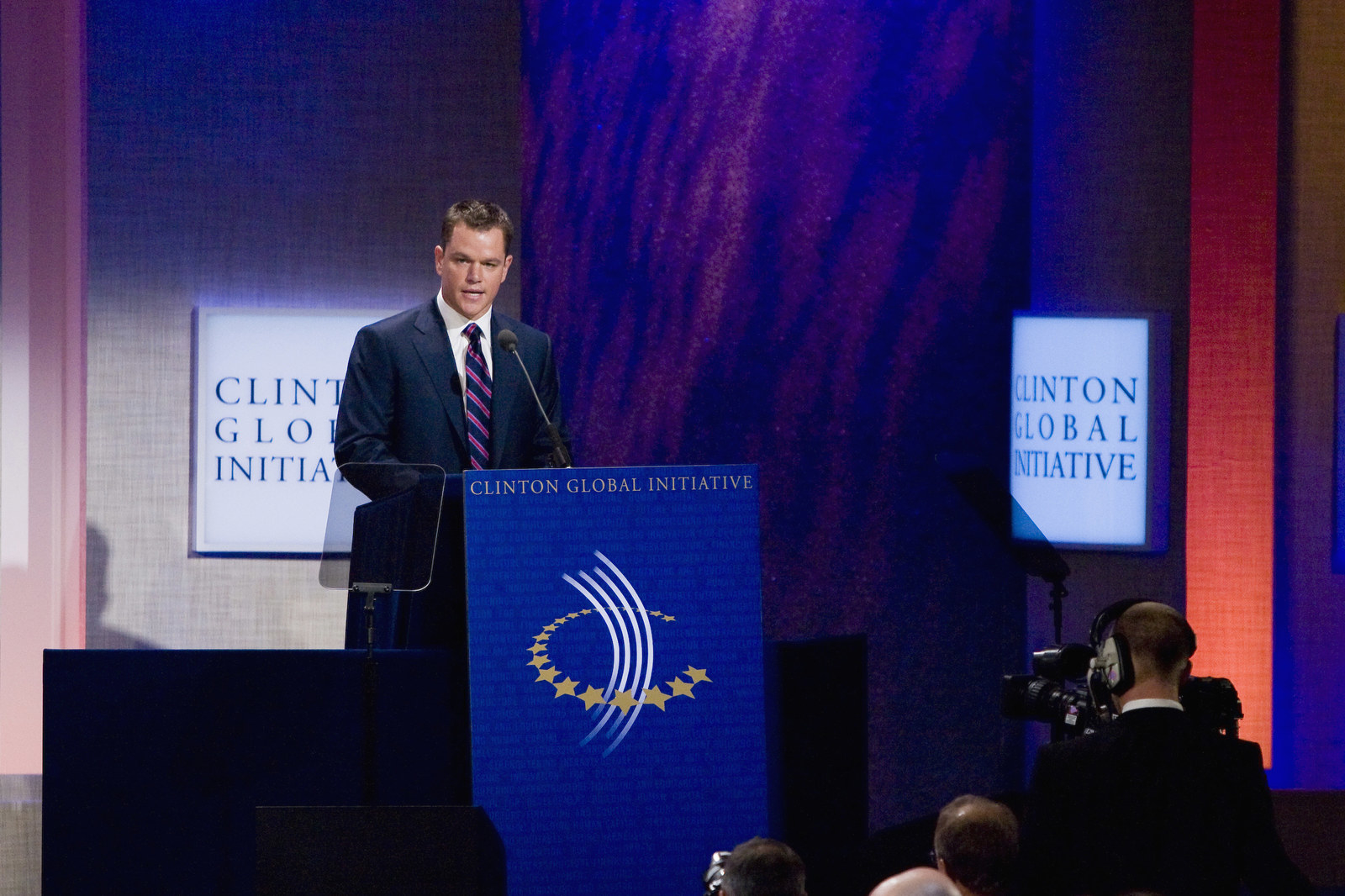
In 2015, Damon signed up for the reboot of HBO’s Project Greenlight, the pioneering let’s-make-a movie-reality-show that he participated in — along with Affleck — in the early 2000s. The show gives unknown up-and-comers the opportunity to make their own movie and it has yielded several films that have been forgotten to time. A decade on, the formula remains familiar: 13 aspiring directors (including three duos) pitch their take on an existing script to a team of Hollywood executives who are both judges and future coworkers (credited as producers), including Damon, Affleck, the Farrelly brothers (they directed There's Something About Mary), and producer Effie Brown (Real Women Have Curves and Dear White People). But the premiere episode of the reboot went viral for all the wrong reasons.
The directors had to weigh in on a comedy script in which a man is left at the altar and marries a sex worker named Harmony, a black woman whose white pimp beats her. Harmony is the only character of color in this comedy. One potential contender, a directing team (Kristen and Leo, a white woman and an Vietnamese man), showed some sensitivity toward the character.
In the clip that went viral, the judges discussed the potential directors. Brown expressed concern over how each contestant would treat the character of Harmony. She urged the group to consider diversity when picking the winning directors, obliquely referencing the pair of Kristen and Leo. Damon interrupted with a defensive monologue, dismissing Brown’s point, and talking over her. He argued that “when we’re talking about diversity, you do it in the casting of the film, not in the casting of [Project Greenlight].”
View this video on YouTube
Hit with a fusillade of dismissal, Brown’s reaction is telling: “Oooh. Wow. Okay.” As the discussion went on, she noted that the directing pair she was riding for stood out because they were sensitive to the character of Harmony, and Leo even credited his female partner with opening his mind. Instead of responding to her point about this duo, the Project Greenlight judges, a room full of Hollywood executives and professionals, then became defensive, saying “Oh yes, I have a problem with Harmony too.” The clip ends with Damon as a talking head saying he’s glad that Brown flagged the issue of diversity, but you can’t change the rules of the game — it’s about the best filmmaker. He then talked earnestly about meritocracy.
Twitter went off on Damon, coining the term #damonsplaining. The actor ended up apologizing with a statement to Variety. He said that the scene was part of a broader discussion and shown out of context, and concluded with “I am sorry that [my comments] offended some people, but, at the very least, I am happy that they started a conversation about diversity in Hollywood.” What’s disappointing about this apology is that it does not reckon with the source of the problem. Damon talked over his coworker, a black woman surely more attuned to the potential fallout of a stereotypical black female character in the script. His vague comments about diversity didn’t really address the paucity of it in Hollywood. Not to mention the arrogance assumed in his presumption that he “started” a conversation about diversity in Hollywood. (Project Greenlight Season 4’s final product, retitled The Leisure Class, has a zero rating on Rotten Tomatoes.)
Shortly on the heels of Project Greenlight, he had another gaffe, this time about LGBT people. In an interview with the Guardian, he ended a riff on out LGBT actors in Hollywood with this quote: “In terms of actors, I think you’re a better actor the less people know about you period. And sexuality is a huge part of that. Whether you’re straight or gay, people shouldn’t know anything about your sexuality because that’s one of the mysteries that you should be able to play.” Culture writers from Uproxx and the Daily Beast laid into that statement’s implications.
In the Daily Beast, Kevin Fallon noted that only a straight white man who mentioned his civilian wife and four kids, a man who styles himself as the moral compass of the Hollywood establishment, could so blithely imply that sexuality could and should be hidden (for art’s sake), unaware of the political importance of coming out publicly in Hollywood. Again, there was a clumsiness to Damon’s quotes, and while he was attempting to shed light on how sexuality can affect the bottom line, he just sounded like someone who didn’t understand the full weight of other people’s experiences, even though he could easily blather on about it. Damon ended up apologizing on The Ellen DeGeneres Show, saying that he didn’t intend to make anti-gay comments.
The gaffes would continue. In July 2016, a preview for Damon’s film The Great Wall dropped. Wearing a man bun, Damon's awkward presence in the film, especially in the trailer, read like a white man who'd come to save the Chinese. And it came on the heels of two big-budget films that featured straight-up Hollywood whitewashing: Doctor Strange, with Tilda Swinton in the role of an Asian character, and Scarlett Johansson in the then-upcoming anime adaptation Ghost in the Shell.
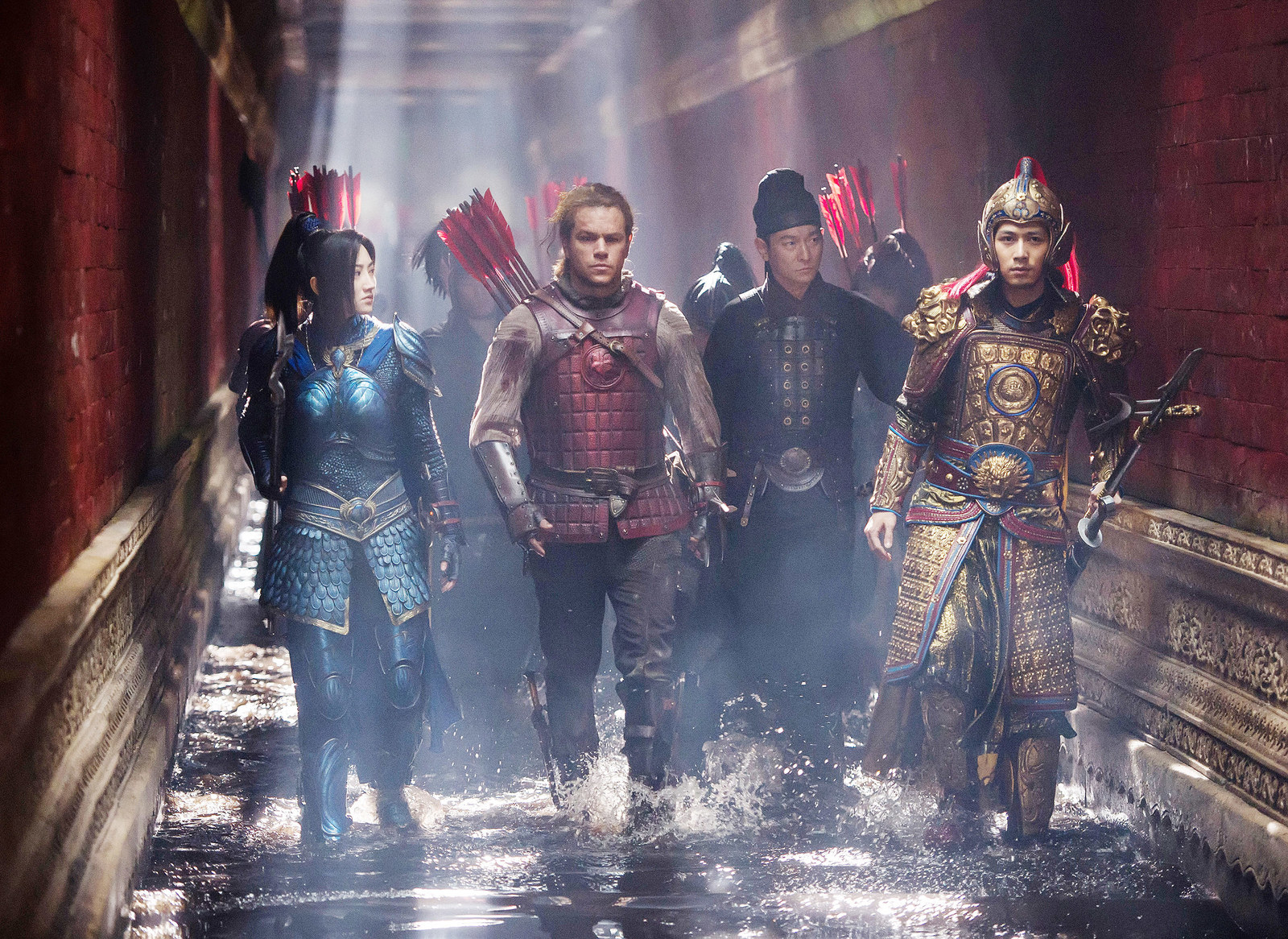
Fresh Off the Boat star Constance Wu wrote a lengthy tweet decrying the trailer. She noted that “our heroes don’t look like Matt Damon” and anticipated criticisms, saying that money isn’t an excuse for this white savior flick, nor are “the Chinese investors.” In her tweet, Wu criticized the cynical system that leads to weird oddities like The Great Wall. Stories reporting on the tweet referred to Wu as “slamming” Damon, thus diluting a valid point about racism in Hollywood into a nonsensical she-said-he-said fight about whitewashing.
When the controversy reached Damon on the red carpet in China, his answer was mildly tin-eared. In an interview with the Guardian, he said: “The whole idea of whitewashing, I take that very seriously ... it’s a monster movie and it’s a historical fantasy and I didn’t take a role away from a Chinese actor. It wasn’t altered because of me in any way.”
In this case, Damon’s response was, again, defensive. He didn’t acknowledge the movie’s awkward optics and how they played in the US. He simply said that he wasn’t guilty. It was a response that could’ve worked pre-internet, but Wu’s point had snowballed into something bigger than she said, he said. With the media aggregating the news, The Great Wall was becoming the symbol of all white savior films, and Damon was in a tricky position to respond to a vague mob’s frustrations with Hollywood whitewashing. There was a response that could’ve worked in which Damon celebrated the film as its own unique event, but instead, the actor focused on his own actions, and why he wasn’t a bad person. The Great Wall ended up flopping in the United States (but made tons of money worldwide).
These gaffes betray a blithe obliviousness on Damon’s part to what the world is like right now, a world where people are empowered by social media to state their feelings,where they can make clear that diversity in movies matters to them. But these gaffes pale in comparison to the complicated fashion in which Damon has publicly grappled with issues of sexual harassment committed by men he knows. Too often, his actions contradict his words, and the result has been eyebrow-raising at best.
Damon was the impetus behind 2016’s Manchester by the Sea, the moving, downbeat Kenneth Lonergan film starring Casey Affleck, who won the Best Actor Oscar for his role as an emotionally numb janitor who takes care of his teenage nephew. The story of how it got made is a little knotty: The initial idea for the plot came from Damon and John Krasinski. The two actors asked playwright, screenwriter, and director Lonergan to take a crack at the script. Lonergan turned in a beautiful piece of work with shark jokes, and Damon was slated to direct it and star in it for awhile, until his A-list schedule took up too much of his time. He dropped out as director. Lonergan took over. Next, Damon dropped out as the lead, claiming that the only actor who could do this role justice was Casey Affleck, his best friend’s little brother.
Lonergan had not made a movie since 2011’s Margaret, a masterpiece released after four years and a pair of lawsuits, a torturous experience that left him skittish about working in Hollywood. Affleck, on the other hand, had his own set of problems: He squandered his Hollywood momentum after his 2007 Oscar nomination for The Assassination of Robert Ford by the Coward Jesse James in order to direct the cynical “documentary” I’m Still Here about his then-brother-in-law Joaquin Phoenix’s “retirement” from acting and subsequent pursuit of a rapping career. Two women who worked on the production sued him for sexual harassment, and the lawsuits were brought to a settlement.
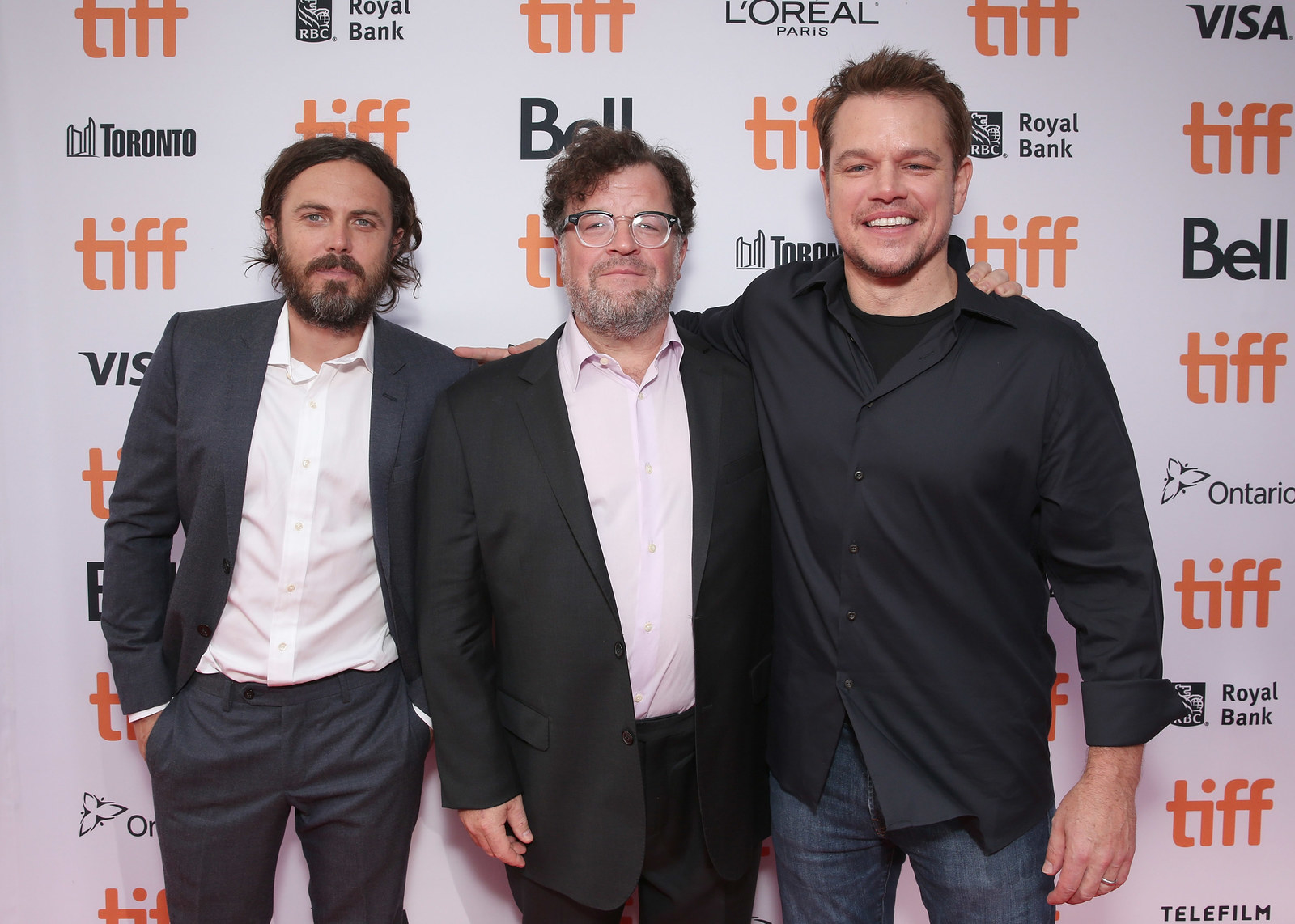
Damon was the producer on Manchester by the Sea; he had final cut in an effort to protect his friend Lonergan who’d been burned before, and after its rapturous debut at the 2016 Sundance Film Festival, it was clear that it was a contender for the Oscars. This status presented a quandary: the not-soundbite-friendly Lonergan and the mumbly Affleck, who made a whole film about his contempt for the media, were truly not the ideal guys to sell the picture, when there was an A-list actor ready to testify to its greatness. There was another problem looming: earlier that year, another Oscar-hopeful Sundance 2016 hit, Birth of a Nation, sank in August before its October release date as director Nate Parker tried to get ahead of the news story concerning his 1999 rape charges. With that recent controversy, it looked likely that Affleck’s sexual harassment allegations would end up as part of the conversation.
In short: It was complicated. But despite the fact that Damon was supporting a film that he produced, an artist who he championed and encouraged (Lonergan), the lingering effect of all this work is that Damon was putting his name behind a film that served as the comeback project for Casey Affleck, a man who settled two sexual harassment suits that could still be read online in their queasy entirety. As Allie Jones wrote in the Cut, Affleck’s Oscar pitch — the shy and retiring little brother of Ben, so authentic — did not square with the actions described in the lawsuits: “His behavior … is not the behavior of a humble actor uncomfortable with fame. It is the behavior of someone who uses his own power and privilege to take what he wants from women.”
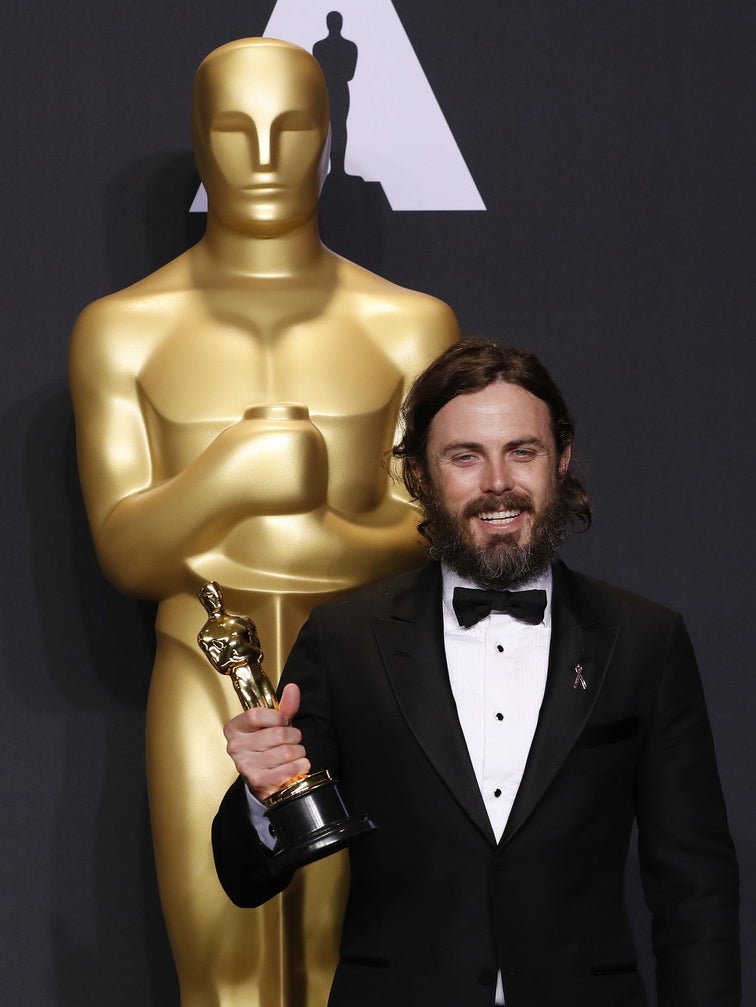
In the long slog of an Oscar campaign, the media was notably silent on Casey’s allegations, running glowing page-one profiles with barely a mention. (Parker, on the other hand, tried to get ahead of the case and the fallout was career-ending. His IMDb page lists no future projects save one project for which he is the writer and director.) Damon was ubiquitous as a supportive presence on YouTube and in TV ads.
Oscar campaigns ride on people’s willingness to schmooze. Manchester by the Sea could’ve disappeared without an A-list actor behind it as a public face. Damon’s work meant that a beautiful movie was seen by the public, and it also played a role in another frustrating tradition: that Hollywood gave another award to a man with sexual abuse allegations. In other industries, Affleck’s past lawsuits could color whether he could get work. In Hollywood, he won an Oscar and his next project received worldwide distribution.
Eight months later, the New York Times published a blockbuster report — with the New Yorker’s devastating follow-up — on the scores of women who have accused Harvey Weinstein, formerly head of Miramax and later the Weinstein Company, of sexual harassment, assault, and rape. The stories keep coming. And the internet, of course, is curious about the reactions of Matt Damon and Ben Affleck, two best friends who were sold to America by Weinstein, and who had recently wielded their own star power to get Casey an Oscar. Did they know about this powerful man’s predatory behavior? Would they speak out against it?
Affleck immediately released a statement on Twitter, saying that he was “angry and saddened” and the allegations against Weinstein made him sick. Actor and director Rose McGowan, whose harrowing Weinstein experience affected her career and her personal life, accused him of lying. Next, women took to Twitter to relay Affleck’s own history as a grabby talk show guest and party attendee. Actor Hilarie Burton said that Affleck groped her when she was a 19-year-old host on Total Request Live. Makeup artist Annamarie Tendler noted that Affleck grabbed her butt at a Golden Globes party. In classic PR crisis mode, Affleck adopted a cute dog.
Damon, a good employee who has two movies to promote this fall, has had to do the press rounds, and, consequently, they include some explanations regarding what he knew about Weinstein. His initial attempt went badly: The Wrap’s Sharon Waxman, in a detailed report about her experience reporting on Weinstein, noted that Damon called her in 2004 in order to “kill a story.” Damon, in a softball interview with Deadline — featuring mutual fawning over fatherhood — denied the details. He said that he was just following orders and relayed his experience with a Miramax employee. Waxman then corrected her story to verify Damon’s account and tweeted that she “endorsed” his statement.
In that same Deadline interview, the actor expressed his disgust over the Weinstein allegations, starting with “as a father of four daughters,” a phrase whose meaninglessness was criticized by Vulture’s Hunter Harris: “Only a sociopath needs a daughter to make him queasy enough at the thought of a sexual predator in his industry to do something about it.”
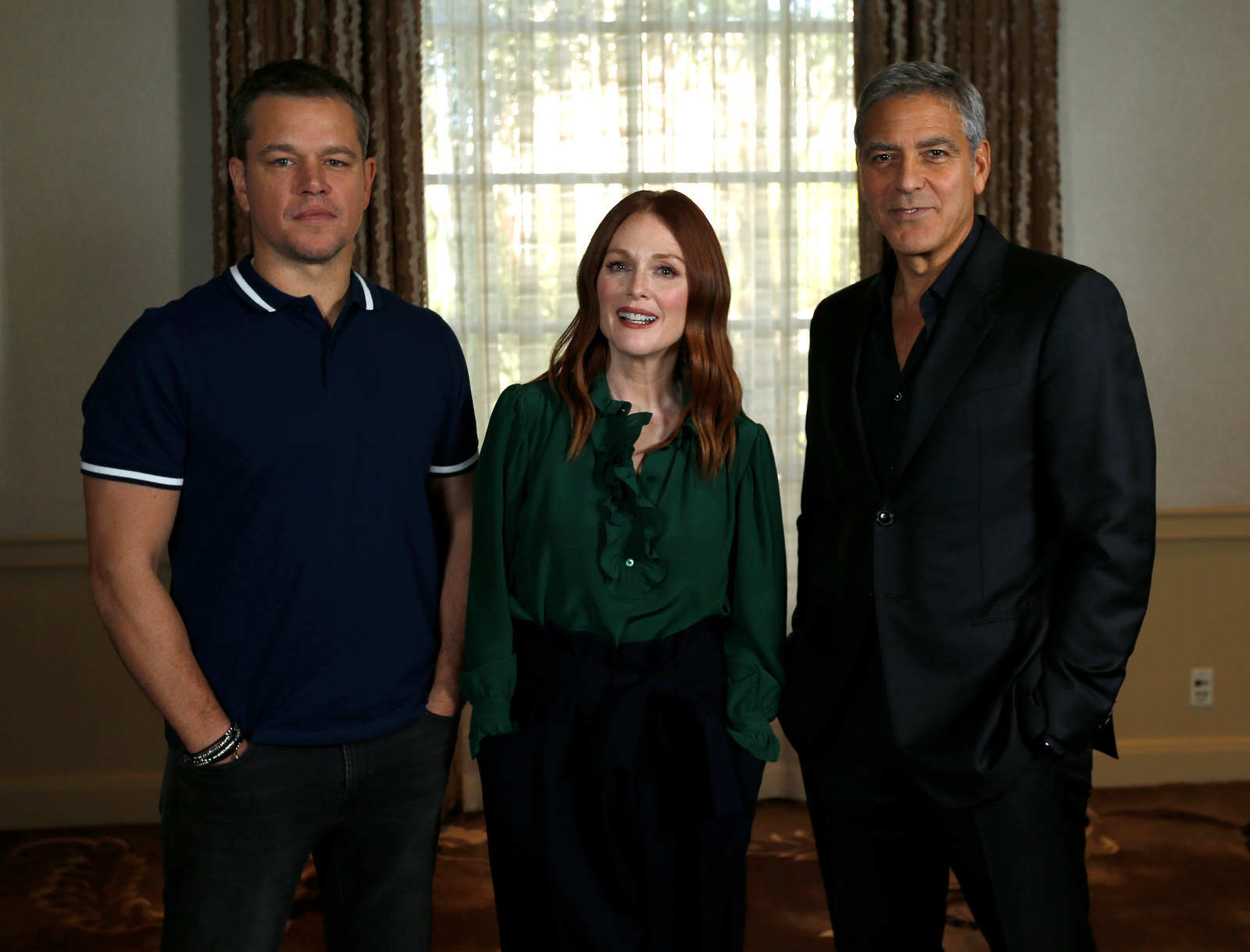
A week later, Damon continued to blunder through the Suburbicon press tour. Sitting on Good Morning America alongside Clooney, the two A-listers said that they did not know the depth of Weinstein’s alleged crimes. Damon admitted that he knew about the producer’s predatory behavior toward Affleck’s then-girlfriend, Gwyneth Paltrow, but he presumed that “she handled it.” Damon and Clooney said the right-sounding things. Both men didn’t know the extent of the allegations, both men think sexual assault is bad, and both men think there needs to be structural change. Damon apologized if he “missed something.”
But their outrage came slowly, two weeks after Lena Dunham published a scathing New York Times op-ed noting that there was a complicit silence coming from powerful Hollywood men, writing, “The reason I am zeroing in on the men is that they have the least to lose and the most power to shift the narrative. ”
The Weinstein case is still unfolding and it’s still unclear who knew what when. But what we have learned is that again, Damon’s optics are faulty and ham-fisted. They read badly in the wake of a months-long campaign to sweep Casey Affleck’s past under the rug so that he could get an award. They solve no problem, illustrating the fact that for Damon, social issues only matter through his lens and his identity.
His struggles in the spotlight for the past couple of years are emblematic of how the self-styled good-guy Hollywood liberal has not caught up to the world we live in today. He’s been persistently oblivious regarding the needs and voices of marginalized Hollywood, who can now call him out through the power of a public platform.
It’s easy to make mistakes on the internet — in fact, messing up one day doesn’t necessarily make you a villain. It is possible to apologize. It is possible to take action. It’s possible to use power in order to give other people opportunities. The thing that smarts about Damon is that he is a person with considerable political capital. At a crucial moment in Hollywood, Damon has the opportunity to use his power to shift the balance for people whose experiences he’s largely overlooked and call for meaningful structural changes. The way he chooses to use his influence suggests that he still believes that we live in a meritocracy, but one that works only for men who look just like Matt Damon. ●
Elisabeth Donnelly is a writer and editor in New York working on a collection of essays. She is also the cowriter of the young adult trilogy The Misshapes (Polis Books) under the name Alex Flynn.

